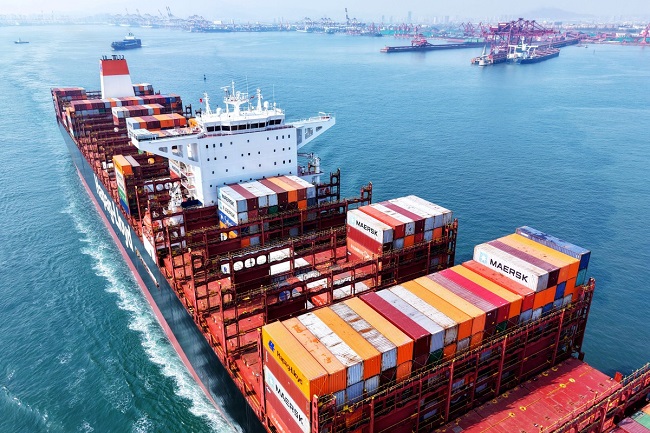President Bola Tinubu has reassured Nigerians that the economy is on a growth trajectory, as the country now exports more than it imports.
This was revealed by the President while delivering his address on Wednesday, as Nigeria marks its 65th Independence Day anniversary.
According to him, Nigeria has attained a net exporter status, recording a trade surplus for five consecutive quarters, with trade surplus increasing by 44.3% in Q2 2025 to ₦7.46 trillion ($4.74 billion), the largest in about three years.
He said goods manufactured in Nigeria and exported jumped by 173% in the period under review, while non-oil exports, as a component of export trade, now represent 48 per cent of the Federal Government’s revenue, compared to oil exports, which currently account for 52 per cent.
“We are now selling more to the world than we are buying, a fundamental shift that strengthens our currency and creates jobs at home. This signals that we are diversifying our economy and foreign exchange sources outside oil and gas.
He said Nigeria’s economy has grown stronger in the last three years, with the external reserves increasing to $42.03 billion in September 2025, the highest since 2019.
The tax-to-GDP ratio has risen to 13.5 percent from less than 10 percent, he said, adding that the ratio is expected to increase further when the new tax law takes effect in January.
“The tax law is not about increasing the burden on existing taxpayers but about expanding the base to build the Nigeria we deserve and providing tax relief to low-income earners.”
Oil Production Rebounds
The President said oil production rebounded to 1.68 million barrels per day from barely one million in May 2023.
He tied the increase to improved security, new investments, and better stakeholder management in the Niger Delta.
“Furthermore, the country has made notable advancements by refining PMS domestically for the first time in four decades. It has also established itself as the continent’s leading exporter of aviation fuel.
READ ALSO: Peace Has Returned To Liberated Communities In North-East, North-West — Tinubu
Naira Stabilises
He said that the Naira has stabilised from the turbulence and volatility witnessed in 2023 and 2024, with the gap between the official rate and the unofficial market reduced substantially, following FX reforms and fresh capital and remittance inflows.
“The multiple exchange rates, which fostered corruption and arbitrage, are now part of history. Additionally, our currency rate against the dollar is no longer determined by fluctuations in crude oil prices.”
Under the social investment programme to support poor households and vulnerable Nigerians, Tinubu noted that ₦330 billion has been disbursed to eight million households, many of whom have received either one or two out of the three tranches of ₦25,000 each.
Coal mining recovered dramatically from a 22% decline in Q1 to 57.5% growth in Q2, becoming one of Nigeria’s fastest-growing sectors, he said.
“The solid mineral sector is now pivotal in our economy, encouraging value-added production of minerals extracted from our soil.”
The President added that the administration is expanding transport infrastructure across the country, covering rail, roads, airports, and seaports.
“Rail and water transport grew by over 40% and 27%, respectively. The 284-kilometre Kano-Kastina-Maradi Standard Gauge rail project and the Kaduna-Kano rail line are nearing completion.
“Work is progressing well on the legacy Lagos-Calabar Coastal Highway and Sokoto-Badagry Highway. The Federal Executive Council recently approved $3 billion to complete the Eastern Rail Project.”
Stock Market Booms
The President said the world is now taking notice of the economic reform efforts, adding that the stock market has recorded a boom.
“Sovereign credit rating agencies have upgraded their outlook for Nigeria, recognising our improved economic fundamentals.
“Our stock market is experiencing an unprecedented boom, rising from an all-share index of 55,000 points in May 2003 to 142,000 points as of September 26, 2025.”
He noted the cut in interest rates to 27 per cent by the Central Bank of Nigeria (CBN) at its last Monetary Policy Committee (MPC) meeting.
“At its last MPC meeting, the Central Bank slashed interest rates for the first time in five years, expressing confidence in our country’s macroeconomic stability,” he said, adding that the economy was on the verge of recovery.
“Under our leadership, our economy is recovering fast, and the reforms we started over two years ago are delivering tangible results. The second quarter 2025 Gross Domestic Product grew by 4.23%—Nigeria’s fastest pace in four years—and outpaced the 3.4 per cent projected by the International Monetary Fund. Inflation declined to 20.12% in August 2025, the lowest level in three years. The administration is working diligently to boost agricultural production and ensure food security, reducing food costs.
“In the last two years of our administration, we have achieved 12 remarkable economic milestones as a result of the implementation of our sound fiscal and monetary policies.”
He also said the non-oil sector has recorded an increase, signaling a significant shift in the country’s usual dependence on oil revenue.
“We have attained a record-breaking increase in non-oil revenue, achieving the 2025 target by August with over N20 trillion. In September 2025 alone, we raised N3.65 trillion, 411% higher than the amount raised in May 2023.”
The President also noted that the country’s debt service-to-revenue ratio has been significantly reduced from 97% to below 50%.
“We have paid down the infamous ‘Ways and Means’ advances that threatened our economic stability and triggered inflation. Following the removal of the corrupt petroleum subsidy, we have freed up trillions of Naira for targeted investment in the real economy and social programmes for the most vulnerable, as well as all tiers of government,” he said.

